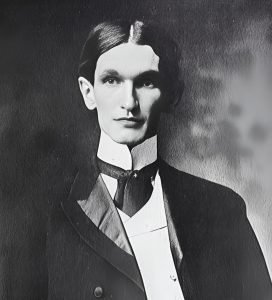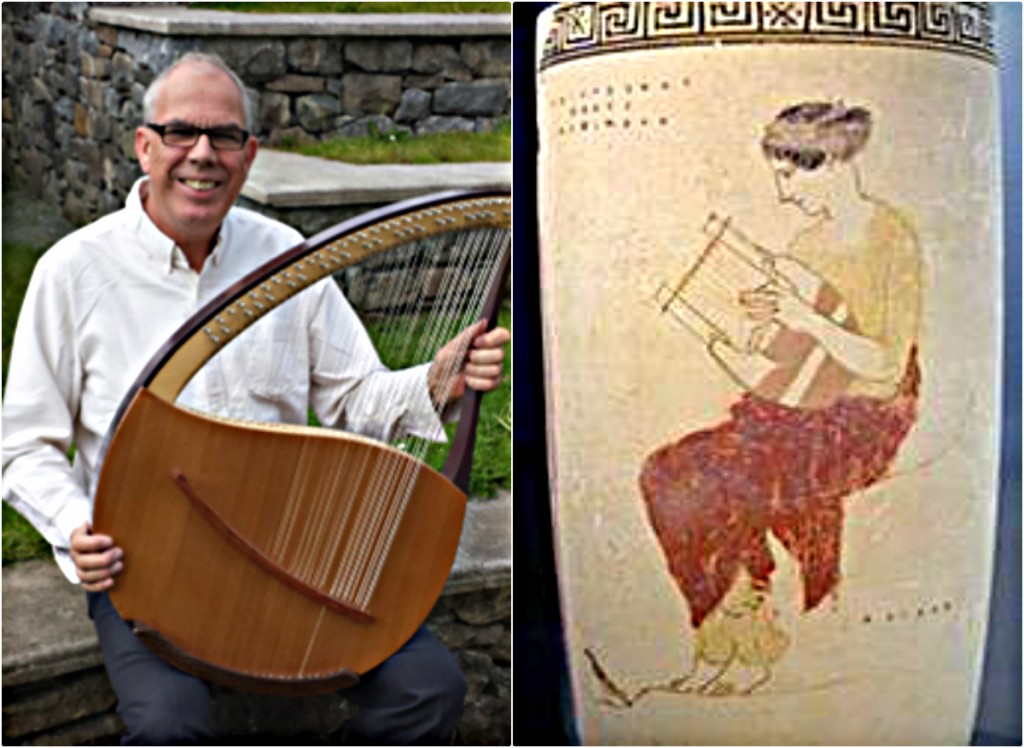
Latin Professor William “Billy” Francis Gill graduated from Trinity College in 1894, and completed his graduate work at Johns Hopkins University in 1898. He returned to Trinity to teach Latin from 1898 until his death from pneumonia on October 18th, 1917 at Watts Hospital, now the North Carolina School of Math and Science. He established Duke’s Classical Club in 1910, and collective with other faculty, the 9019 Honor Society. The only endowment for collections in Classical Studies was established in honor of Professor Gill by his friends and family in 1917.

Professor Gill emerges from archival sources at Duke and Johns Hopkins as a studious scholar, an inspiring teacher, a kind friend, and a reflective, observant, and a witty writer. The following offer glimpses of his personality and character.
Billy Gill was born in Henderson, North Carolina, on October 5th, 1874, to Dr. Robert Jones Gill and Anne Mary Fuller. He was highly regarded as a student at Trinity College, and even more highly respected as a professor and scholar after he returned in 1898.
Duke President John F. Crowell wrote the following recommendation for his application to Johns Hopkins University in 1894:
In general, it may be said that few of our students have ever had better groundwork for university study than he has. His four years here have all been years of solid growth and detailed attention to the regular courses in which he ranks among the first. In general culture he is advanced beyond his years.
Crowell, John F. Letter. Office of the Registrar records. Box 78, Special Collections, Sheridan Libraries, Johns Hopkins University.

Billy enjoyed writing home. In the 1898 Trinity Archive, an enthusiastic article describes his studies at Johns Hopkins, analyzing the transformation of higher level education over the 19th century, and emphasizing his excitement about independent study as the “great revolution in American colleges”. He describes the demanding study schedule, the richness of the libraries in Baltimore, but his clever wit is also evident when, as a classical scholar, he defines civilization, “if the spring is specially beautiful and his landlady’s daughter very attractive, he may consent …(to) remember earlier days before he abandoned civilization, as to take his lady friend.”
One quote from that article is gratifying to anyone who loves libraries:
Another most commendable feature in Hopkins University life, is its library. Unlike the other university whose library system I have investigated, the Hopkins library is thrown open to students without reserve…. This room is the student’s workshop. This is the Socratean basket in which he is lifted from the business world.
Student Life at Hopkins. Trinity Archive. Vol 12, p. 70. November 1898
Professor Gill’s fresh approach to his subject of Latin is evident in two articles he wrote for his hometown newspaper describing his summer trip to Rome and to Athens in 1902. In them he writes of his love for the Classics with a delight in its modern context.
This first trip was undertaken with no desire to advance new theories on the location of this temple or that street, but on the contrary it had the very modest purpose of re-reading my Catullus, Horace or Virgil amid the city that knew them. … But, greater wonder still, there is no sign of the Rome of the times of Caesar and Cicero. Everything speaks of today. Is it for this that I have come thousands of miles, to see the same city that might be visited at any time at the cost of a few hours ride? No, Rome differs from all other cities at just this point. She unites the old with the new, builds upon her past in a way that no other city can.
Letter from Rome: Professor W. F. Gill Writes Interestingly from the “Eternal City”. Greenleaf. August 7, 1902
His progressive approach to teaching the Classics is evident in his response to changes in the curriculum, which relinquished Latin as a requirement, and must have generated his own mixed feelings. Trinity’s original entrance exams and curriculum had been traditional, as with most colleges and universities before 1900, requiring students to master both Greek and Latin. Both Latin and Greek became optional with the new century, and a student could study either French or German instead.
He lived through that transition in educational ideals which reduced the requirements of Latin both in the curriculum and for entrance. … Moreover contemporary with this change was one in his own interests. Trained in the old school of linguistics, he gradually turned to the interpretation of Latin literature and allied phases of classical antiquity.
William Francis Gill – A faculty Memoire. Trinity Alumni Register. Vol. 3, p. 261-263. 1918.
The death of Professor Gill happened very suddenly, from a class on Monday October 14th to Watts Hospital in three days. Newspaper articles across the State, President William P. Few’s speech at his Memorial on campus, collective remembrances by faculty in 1918, all attest to the esteem of his colleagues, students, friends and family and their deep loss. As a high officer among the Masons, the order was responsible for the burial ceremony in Henderson. In 1925 Alumnus Linville L. Hendren (T 1900) described his fellow as “that high minded gentleman and friend to all students..”
Alumni Address of Linville L. Hendren. Trinity Alumni Register . Vol. 11, p. 327. 1925.
Another testimonial to his character and his extensive influence on the college ethos, is also from the faculty Memoire, describing his scholarship and kindness.
In our deliberations he was uncompromising in his conceptions of right and wrong, always devoted to high standards of scholarship and conduct. In the estimation of moral and intellectual values the loss of his counsel and influence will be seriously felt by his colleagues.
Distinctive as were these traits of character, they were overshadowed by another quality, his capacity for friendship. All members of the community were subjects of his thoughtfulness. His was that rare degree of kindliness which never waited for, but sought, opportunities to do service.

An article in his hometown newspaper, written on October 19th, notified the local communities of his death.
Trinity College is bereaved, and the day’s work, hopefully planned, ended in a mission of gloom. The flag floats at half mast, and all class activities were suspended for today and tomorrow. The body lies in state at the East Duke building, with guards of honor from college organizations on watch. Chapel exercises tomorrow morning will be dedicated to the review of the life of the college professor and man.
Professor of Trinity is Dead. News and Observer. October 19th, 1917
The text on his gravestone reads:
ONLY WHEN LIFE’S TAPESTRIES ARE ALL
FINISHED CAN THE GOLDEN THREADS OF HIS
INFLUENCE BE WOVEN INTO A MASTERPIECE TO
BE JUDGED BY THE MASTER ARTIST HIMSELF
Professor Gill is buried next to his mother in the Fuller Family Cemetery in Vance County. A life size portrait hangs in the Classical Studies Conference Room in the Allen Building on West Campus.
Many thanks to Mr. Allen Dew, and Ms. Betty King, both of Granville County, North Carolina. Mr. Dew coordinated the search to locate Professor Gill’s gravesite. Ms. King kindly and generously shared her personal research on Professor Gill. Archivists Ms. Ani Karagianis (Duke University Archives) and Ms. Brooke Shilling (Special Collections, Johns Hopkins University) were invaluable in their research assistance.



